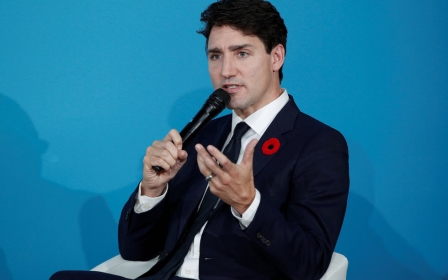US ambassador urges German banks to suspend accounts of groups backing BDS

The United States ambassador to Germany has called on German banks to suspend accounts tied to groups that support the boycott of Israel, The Jerusalem Post reported, amid ongoing pressure on Palestinian rights groups worldwide.
Richard Grenell said German banks should "cut ties to all organisations linked to" the Boycott, Divestment and Sanctions (BDS) movement, the Israeli newspaper reported on Wednesday.
Grenell pointed to a resolution passed last year by the German parliament, the Bundestag, "condemning the BDS movement and calling on the federal government to resolutely oppose it".
"Organisations and people that undermine Israel's security should be condemned," Grenell told the newspaper.
The Jerusalem Post said the ambassador made his call after it reported on an account at the German Bank for Social Economy that belongs to Jewish Voice for a Fair Peace in the Middle East, which supports BDS.
New MEE newsletter: Jerusalem Dispatch
Sign up to get the latest insights and analysis on Israel-Palestine, alongside Turkey Unpacked and other MEE newsletters
Israel's supporters, including major Jewish community groups in Germany, have urged customers of that bank to suspend their accounts over its decision not to sever ties to the pro-BDS group, the newspaper reported.
Grenell's comments also come amid a torrent of pressure against Palestinian human rights activists around the world, as well as both legal and legislative efforts to criminalise the BDS movement across the US.
Endorsed by 170 civil society organisations, BDS seeks to pressure Israel to end its human rights abuses against Palestinians.
Early last month, the US Senate voted overwhelmingly in favour of a bill that encourages states to cut off contractors who boycott Israel. The legislation has been condemned as an affront to free speech, and if it passes in the US House of Representatives, it is expected to be met by a constitutional challenge.
Still, that hasn't stopped several US states from seeking to outlaw BDS.
This follows widespread efforts by the Israeli government to crack down on the movement, which include attempts to smear BDS activists and prevent the group's supporters from entering the country.
The Israeli government has encouraged its allies to speak out against the BDS movement, as well.
In Germany, the Anti-Semitism Resolution, which passed in early 2018, called on the government to "decisively oppose" BDS, according to the country's public broadcaster, Deutsche Welle.
The resolution also affirmed that the German parliament "strongly condemns the call for a boycott of Israeli businesses and goods as well as the labelling of goods from Israel with 'Don't Buy' signs".
Berlin also appointed a commissioner for anti-Semitism, who told Deutsche Welle last year that "BDS must be classified as anti-Semitic in both its aims and its methods".
Proponents of the BDS movement have rejected claims that it demonises Israel, saying the non-violent tactic is modelled on the struggle to end apartheid in South Africa in the 1980s.
BDS organisers also reject charges of anti-Semitism and argue that Israel's supporters aim to stifle debate about Palestinian human rights by conflating legitimate criticism of Israeli policies with anti-Jewish hatred.
Middle East Eye delivers independent and unrivalled coverage and analysis of the Middle East, North Africa and beyond. To learn more about republishing this content and the associated fees, please fill out this form. More about MEE can be found here.




